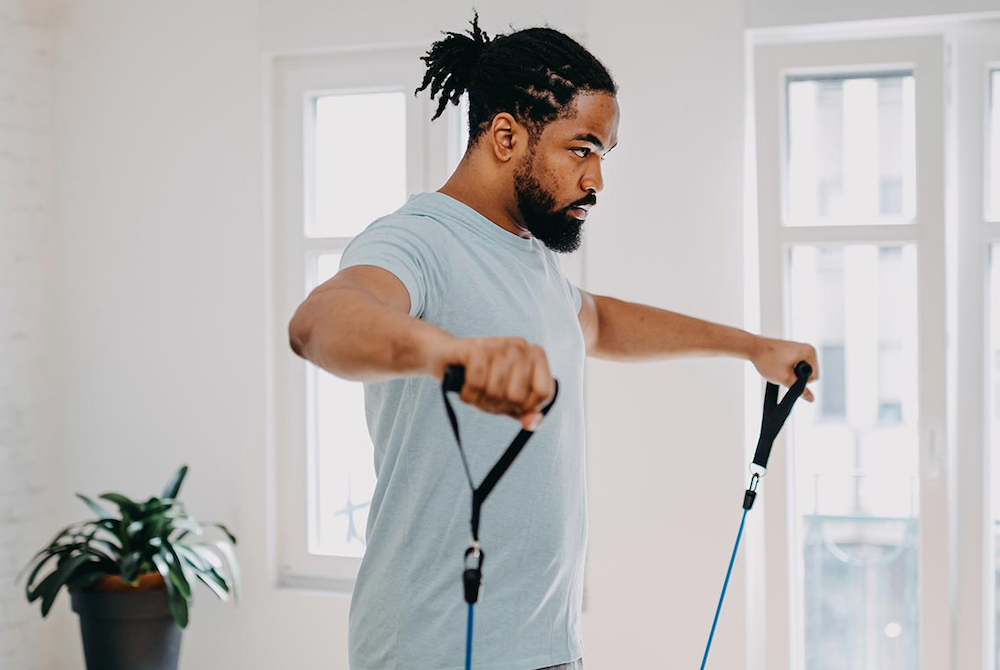
Wake Up And Walk! 7 Benefits Of Taking A Morning Stroll
By
Nick Parkinson, M.Ed., AT, ATC, TSAC-F
Henry Ford Health
May 3, 2022
 Still having difficulty fitting exercise into your day? Start by heading out for a morning walk.
Still having difficulty fitting exercise into your day? Start by heading out for a morning walk.
No matter your fitness level, walking offers tremendous benefits, including improving your mood, managing your weight, increasing your energy and reducing your risk for disease. All you need is a good pair of walking shoes and a place to stroll.
7 Benefits Of A Morning Walk
Starting your day with a morning walk helps you check something important off your daily to-do list – your fitness.
Even if you only have time for a 10-minute walk each morning, you’ll have up to 70 minutes of exercise by the end of the week. And any type of movement that you add in later in the day, whether it’s taking the stairs or walking to your car at the far end of the parking lot, improves your overall health.
Morning walks offer many benefits, helping to:
Boost your inner athlete. Taking a morning walk boosts your stamina, flexibility and energy. As your fitness improves, you’ll be able to move through your daily activities more easily.
Improve your mood. Getting outside gives you a chance to enjoy fresh air and nature. Walking, like any form of exercise, reduces stress and anxiety. You’ll start the day with a positive attitude, better able to manage challenges during the day.
Increase your productivity. After a morning walk, you feel energized and ready to take on the day. Starting your day with physical activity improves your concentration and productivity.
Keep you standing tall. Many of us are sitting at work or school for several hours each day, often without watching our posture. Walking with your shoulders back and head held up improves posture. Walking also improves your core muscles, which help support your spine.
Manage your weight. After a full night’s sleep, walking helps jump-start your metabolism, allowing you to burn calories at a faster rate. Along with a healthy diet, walking can help manage weight.
Reduce your risk for disease. A regular walking routine can reduce your risk for diabetes, heart disease, hypertension (high blood pressure), obesity and some cancers.
Strengthen your bones. Our bodies are constantly making new bone and breaking down old bone. After age 50, we lose bone mass as our bodies break down old bone at a faster rate. Along with a healthy diet, weight-bearing exercise like walking strengthens your bones and reduces your risk for osteoporosis.
How To Start Your Morning Walk Routine
Keep these strategies in mind as you plan your morning stroll:
Eat a light snack before you walk. After sleeping all night, it’s helpful to eat a light snack or breakfast before heading out the door. Toast with almond butter or some yogurt with nuts and berries can give you the energy you need, especially if you’re planning a longer walk.
Check out different walking routes or events. On a busy morning, you may choose to walk close to home to save time. When your schedule permits, explore different neighborhoods, nature preserves or trails in your area. You may also want to check out local 5K races — many of these events welcome walkers.
Don’t forget to stretch. After walking, take a few minutes to stretch your leg muscles to work out any knots in your calves, hamstrings or thighs.
Increase impact with weights and intervals. As you build your stamina, boost the benefits of your walk by holding light weights or wearing a weighted vest. Try turning your walk into an interval training session by alternating between a fast and slow pace.
Prepare for the weather. To avoid falling on icy winter sidewalks, wear proper boots and spikes. Wear hats, scarves and gloves to protect your skin from frostbite. Wear a hat and sunscreen in the summer heat. Carry a water bottle to stay hydrated, especially on longer walks.
Schedule your morning walks. Add a morning walk to your calendar and keep the appointment. Over time, morning walks can become a habit you won’t want to give up.
Walk with a buddy. Find a walking partner who will hold you accountable for your commitment to exercise. To enjoy even more socializing as you walk, check out walking groups in your community.
To find a doctor at Henry Ford, visit henryford.com or call 1-800-436-7936.
Nick Parkinson, M.Ed., AT, ATC, TSAC-F Supervisor of Athletic Training with Henry Ford Sports Medicine, also leads Sports Performance training at the William Clay Ford Center for Athletic Medicine. He is a regular contributor to Henry Ford LiveWell. Learn more about Nick

How To Warm Up Correctly Before Playing Different Sports
July 10, 2024
When you see professional athletes gearing up to race or getting ready to take the field, you’ll notice that they’re always in motion. That’s because they are warming up in preparation for going all out.
 And there’s a good reason why you’ll never see a pro go straight from the bench into a full sprint. “You need to allow your muscles to gradually accept the demands of your activity,” says Jennifer Burnham, a certified athletic trainer at Henry Ford Health. “Otherwise you risk causing an injury.”
And there’s a good reason why you’ll never see a pro go straight from the bench into a full sprint. “You need to allow your muscles to gradually accept the demands of your activity,” says Jennifer Burnham, a certified athletic trainer at Henry Ford Health. “Otherwise you risk causing an injury.”
Why You Should Warm Up
As the name implies, a warmup is a series of movements designed to warm up your muscles. “You want to increase blood flow to your muscles and loosen up and lubricate your joints,” says Burnham. “And you need to do it gradually, so that your body has time to adapt to the increasing intensity.”
Warming up involves more than just stretching. According to Burnham, studies have actually shown that holding a static stretch when muscles are cold can decrease performance. “Instead, before activity you want to do a dynamic warmup that incorporates movement as well as some gentle stretching."
Your warmup only needs to take 5 to 10 minutes. When deciding what to do, think about the movements you’ll be doing in your activity and which muscles and joints are most involved. Then choose movements that slowly get them warmed up and primed for more intense action.
How To Warm Up For Different Activities
No matter your sport, the warmup before your workout should include some exercises to activate and engage your core (the abdominal and back muscles). “Waking up those muscles helps decrease injury potential,” says Burnham. She suggests incorporating bridges and mini squats (no deeper than 45 degrees) into your warmup routine. To do a bridge, lie on your back, knees bent, feet flat on the floor. Tighten your stomach muscles and squeeze your butt as you lift your hips up to form a straight line from knees to shoulders.
The rest of your warmup can be more specific to muscles and movements of your planned activity.
Running
Before a run, or even a jog, you want to warm up all the muscles and joints from the waist down.
- Rotate your hips (lift your knee up and do some circles in both directions to move the joint) and ankles (circle one foot at a time both clockwise and counter-clockwise).
- Get powerful muscles like your glutes and quads ready with high knees and butt kicks.
- Walk on your toes and then on your heels to warm up shin and calf muscles.
- When you’re ready to run, start off slowly and gradually increase your speed.
Racquet sports
You still need to warm up your lower body using the same moves as the running warmup. But you’ll want to add in others specific to the upper body movements of tennis, pickleball or other racket sports.
- Warm up shoulders with big arm circles both forwards and backwards
- Circle your hands in both directions to get wrists ready for action
- Lunge forward and rotate your upper torso to increase your spine mobility
Basketball, soccer and football
You want to make sure your lower body has time to adapt to the demands of sports that require bursts of sprinting and quick shifts of direction. Your warmup should gradually increase in speed and intensity as you move your body in all directions:
- Side shuffles while swinging your arms (shuffle in both directions)
- Grapevines in both directions
- Skip forward, lifting knees high, then skip backward
Swimming
Prepping your body for a swimming workout means warming up your arms, shoulders and upper back.
- Circle arms backwards and forwards
- Use a light resistance band to do shoulder rows
- Use a light resistance band or light dumbbell and lift straight arms up to shoulder height in front and to your sides
- Start with an easy tempo freestyle swim before going into more dynamic strokes like butterfly
Jennifer Burnham is an athletic trainer who sees patients at the Henry Ford Center for Athletic Medicine in Detroit.
To find a sports medicine provider at Henry Ford Health, visit henryford.com/athletes or call 313-651-1969.

